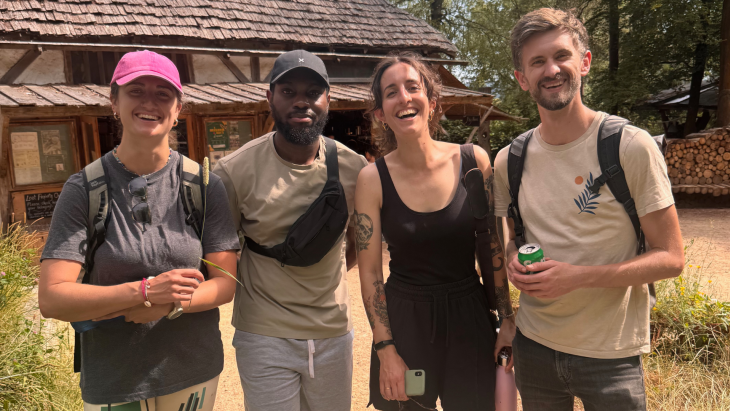The power of giving time: how volunteering improves wellbeing at work

Exploring how a few days away from the desk can recharge more than you might think.
Making space to give back
Since I was a teenager, I’ve always enjoyed volunteering for different projects and organisations. But as an adult, it can be hard to fit it in around work, family life, and other commitments. I’ve been lucky to work at a place for the last six years that offers flexible working, which has enabled me to swap around days off in order to fulfil my volunteering commitments.
That flexibility made it possible, but since 2024, Brightec has gone one step further by offering five days a year for every member of staff to use specifically for volunteering, in addition to annual leave.
My primary volunteering commitment over the last few years has been with Chomp, a Brighton-based charity that runs holiday club-style days during school holidays. They provide families with a freshly cooked meal and activities for all ages. Chomp was originally founded to support families experiencing food poverty, particularly those with children receiving free school meals, but it has since expanded to support a wider network of families.
I also volunteer for The Wild Mind Project, which offers nature-based interventions and creative activities for young people aged 11–25 to support their emotional and mental wellbeing. Both of these generally run during working hours, with Chomp running exclusively during school holidays — a challenge for a working parent!
Previously, I’d taken time off or swapped days to take part in these volunteering sessions. Now, I can simply use my volunteering days. On a personal level, this has made organising my commitments far easier and has improved my overall work–life balance.
Why these days matter
As a research-focused designer, I couldn’t help wondering how the introduction of volunteering days were affecting not just me, but our wider team — and what the bigger picture might look like.
Speaking to Brightec team members who had taken at least one volunteering day in the last 12 months, the picture was clear: the offering has had a positive impact on both personal job satisfaction and people’s perception of Brightec as a company. I wondered if this was unique to Brightec, as a company that strives to ‘do good’, or if this reflected a broader trend.
A wider evidence base
It turns out this isn’t just a Brightec thing — the research backs it up, A 2024 study led by William Fleming, a sociologist and research fellow at the University of Oxford, explored the impact of various wellbeing initiatives on employees. The findings were striking: volunteering was ‘the only one of these interventions which showed… improved wellbeing.’
With Gallup’s 2025 State of the Global Workplace study showing that employee wellbeing has ‘been declining since its peak at 35% in 2022,’ it’s reassuring to know there are still measures that make a tangible difference.
Why volunteering? Fleming suggests that it ‘instills a bit more social meaning into people’s jobs, especially if you’re working for a big corporate global organization [where] it can feel like you’re just making money for the man and spinning paper sheets around.’
Insights from the team
When I asked Brightec team members to reflect on why they felt positively about their volunteering days, their responses echoed this sentiment. One person said, ‘Part of that enjoyment was knowing my time was being spent on a charitable cause, and part of it was just the enjoyment of doing something different — in a different space, with different creative parameters, and for a different purpose.’
Another noted that it’s a ‘great way for Brightec to support a number of very different charities without needing to decide at a company level who to support.’
This mirrors Deloitte’s 2024 Workplace Volunteer Survey, in which 91% of respondents said volunteer opportunities have a positive impact on their overall work experience.
For the number crunchers out there, a study by Pro Bono Economics (PBE) found that the widespread expansion of volunteer days ‘could save between 1.4 million and 2.5 million working days of sickness absence,’ and is ‘likely to drive up productivity through better health and improved skills.’ Even after accounting for the costs of lost time and administration, these schemes could generate net productivity gains of between £1.6 billion and £2.8 billion for the UK economy.
So, volunteering doesn’t just improve wellbeing — it can also benefit businesses in very real, measurable ways.
A more human way of working
What’s become clear — both from the research and from our own team — is that volunteering days aren’t just a nice extra. They genuinely make work feel more human. Taking time out to do something meaningful gives people a sense of purpose that can be hard to find in the day-to-day, and that feeling doesn’t stay at the charity or community project — it comes back into the workplace too.
At a time when wellbeing is such a tricky thing for companies to get right, it’s encouraging that something as simple as giving time away can have such a positive impact.
For us at Brightec, volunteering days aren’t just a perk - they’re a reflection of what we stand for: curiosity, generosity, and care for the world beyond our screens. And for each of us, it’s proof that sometimes the best way to recharge is to give a bit of ourselves to something bigger.
Sources
https://fortune.com/well/article/boost-employee-morale-and-productivity-volunteering/
https://www.gallup.com/workplace/349484/state-of-the-global-workplace.aspx
Looking for something else?
Search over 450 blog posts from our team
Want to hear more?
Subscribe to our monthly digest of blogs to stay in the loop and come with us on our journey to make things better!
